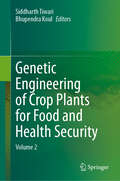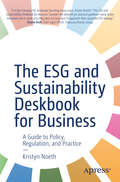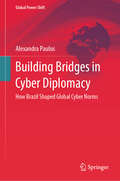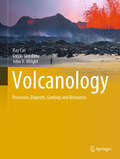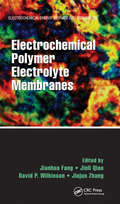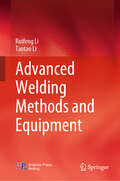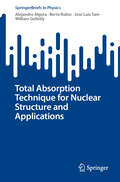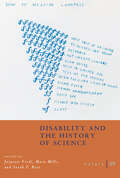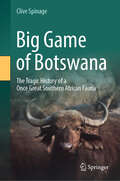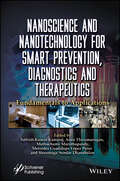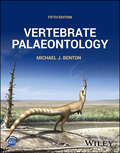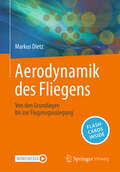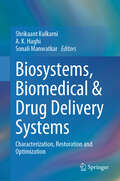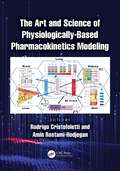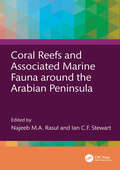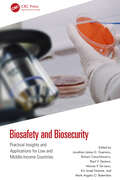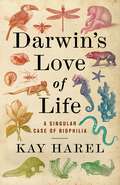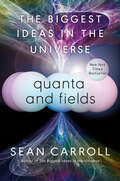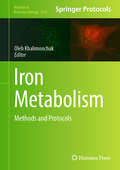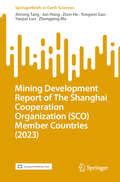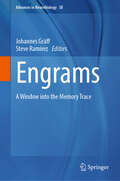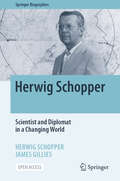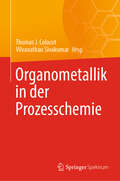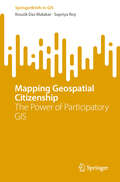- Table View
- List View
Genetic Engineering of Crop Plants for Food and Health Security: Volume 2
by Siddharth Tiwari Bhupendra KoulThis edited volume presents recent advancements in genetic transformation and genome editing, offering a comprehensive understanding of their applications for creating more sustainable crops. These innovations are revolutionizing crop development, enhancing yields, and mitigating environmental challenges.The demand for sustainable crop production, driven by a growing global population and mounting environmental challenges, has never been more pressing. Genetic transformation and genome editing techniques offer precise and targeted ways to enhance crop traits, increase yields, and reduce the need for chemical inputs. The book traces the evolution of these technologies, from the early days of genetic modification to the current era of CRISPR-based genome editing. It covers cutting-edge technologies, from CRISPR-Cas9 to advanced gene editing techniques, while discussing the current scenario and future prospects of GM crops developed either by transgenic or genome editing approaches. The book explores the ethical and regulatory aspects surrounding genetic transformation, providing a complete perspective on this evolving domain.It is an essential read for researchers, students, and professionals in the fields of agriculture, plant sciences, biotechnology, agronomy, as well as policymakers.
The ESG and Sustainability Deskbook for Business: A Guide to Policy, Regulation, and Practice
by Kristyn NoethThe interest in sustainability and environmental, social, and governance (ESG) from stakeholders across all sectors is growing and will continue to do so as we are in the most pivotal decade for meeting the global goals on climate change and sustainable development. This book is a compendium of the international agreements, regulatory advancements, and current practicum to inform a 360-degree viewpoint of the organizations, frameworks, and stakeholders that shape the evolving landscape.Written in a straightforward and conversational tone, you’ll embark on a knowledge journey on the progression of ESG and sustainability and how it directly shapes and informs current practice. It provides insights, discussion, and topical briefings as a side-by-side reader to accompany the rise of ESG and sustainability in business and the markets. The flow of information and reader education begins with the origins of sustainability in international treaties and policy. It then moves on to theadvent and differentiation of ESG, sustainability, and social responsibility; provides substantive issue briefings on the key “E,” “S,” and “G” factors. You’ll continue by walking through the global regulatory and standards paradigms; delve into ESG ratings and indices; and examine in-depth analysis of the respective roles of the corporation, the financial and investment sector, the international bodies, the business interest groups, the NGOs and third-party organizations, and the philanthropic community. You’ll also see that corporations and investors are advancing ESG and sustainability strategies and programs at a record pace. What were once regarded as “nice-to-have” initiatives with voluntary reporting have moved into the regulated sphere with mandatory public disclosures and reporting requirements on greenhouse gas emissions, climate risk and transition planning, biodiversity and nature-related impacts, supply chain transparency, anti-bribery and corruption, humanrights, human capital, and board diversity. The ESG and Sustainability Deskbook for Business threads the needle with best practices, case studies, and takeaways to illustrate the applications and to enhance understanding.What You Will LearnStudy the progression of ESG and sustainability and how related considerations increasingly drive business, policy, and economic decisionsReview Takeaways and best practices to provide insights and discussion pointsUnderstand the critical differences between ESG, social responsibility, and sustainabilityWho This Book is ForESG and Sustainability Practitioners (across all sectors), Corporate leadership, Tech sector (a key growth area for compliance, reporting, and GHG accounting), Investors, Compliance, risk, legal, and corporate governance professionals, Management and board consultants
Building Bridges in Cyber Diplomacy: How Brazil Shaped Global Cyber Norms (Global Power Shift)
by Alexandra PaulusThis book examines the international forums in which states develop cyber norms—“rules of the road” for how governments use information and communication technologies. To understand the dynamics in this emerging field of diplomacy, the book focuses on an often-overlooked actor: Brazil. With the international debate dominated by two camps that can be broadly characterized as the West versus China and Russia, the book demonstrates that Brazil holds a key position as a bridge-builder between these two sides. It paints a rich picture of Brazil’s efforts in shaping cyber norms across such diverse forums as the United Nations, BRICS, and the Organization of American States, while contextualizing these activities in Brazilian domestic cybersecurity policy and foreign policy traditions. This rich case study paves the way for a deeper understanding of how different actors shape international cybersecurity policy.
Volcanology: Processes, Deposits, Geology and Resources (Springer Textbooks in Earth Sciences, Geography and Environment)
by Ray Cas Guido Giordano John V. WrightThis book is a substantially updated, revised and extended version of the book Volcanic Successions, published by Cas and Wright back in 1987. Divided into six major parts, it offers comprehensive information on magma properties; fragmentation processes; subaerial and subaqueous lava types and field textures; sub-volcanic intrusions; explosive or pyroclastic eruptions and deposits; surface sedimentary processes; hydrothermal alteration and lithification, and effects on volcanic rock textures; terminology and approaches to describing and mapping volcanic rocks and terrains; geology of volcanoes and facies models; volcanism and tectonic setting; and to conclude, volcanic-hosted resources. It is a highly up-to-date text, presenting a coherent flow of topics, together with excellent visual material to illustrate key points and deposit features. The new authorship team consists of Ray Cas, Guido Giordano and John Wright, all of whom have extensive experience across the complete spectrum of volcanological processes and deposit types discussed in this exciting new book. The authors approach the diversity of products in volcanic terrains as facies, and use facies analysis and interpretation as a means of constructing facies models for different volcanic settings and their resources. The book is intended as a textbook and research reference book for senior undergraduate and graduate students, researchers and professionals alike.
Electrochemical Polymer Electrolyte Membranes (ISSN)
by Jiujun Zhang David P. Wilkinson Jinli Qiao Jianhua FangElectrochemical Polymer Electrolyte Membranes covers PEMs from fundamentals to applications, describing their structure, properties, characterization, synthesis, and use in electrochemical energy storage and solar energy conversion technologies. Featuring chapters authored by leading experts from academia and industry, this authoritative text: Disc
Advanced Welding Methods and Equipment
by Ruifeng Li Taotao LiThis book helps graduate students master welding theory, advanced welding technology and welding practice. With the continuous development and deepening of welding technology and the rapid development of computer science, the content of "Advanced Welding Methods" has also been expanded. It is divided into seven chapters, including laser welding, electron beam welding, friction stir welding, narrow gap welding, laser-arc hybrid welding, underwater welding, and development of the traditional welding process. The compilation of this book combines theory and practice, focusing not only on teaching and training theoretical knowledge, but also on integrating cases and providing practical training. Advanced Welding Methods and Equipment is a highly theoretical and practical course, which is an important link to improve students' welding practice ability and innovation ability. It is of great help for students to learn and understand welding technology. This book is used as a textbook for graduate students of related majors, and also as a reference for welding technology developers and researchers of related colleges and universities.
Total Absorption Technique for Nuclear Structure and Applications (SpringerBriefs in Physics)
by Alejandro Algora Berta Rubio Jose Luis Tain William GelletlyThis book is the first monograph dedicated to the use of the total absorption technique in beta decay studies. It provides a detailed introduction to the beta decay process and all necessary know-how for the use of the total absorption technique. Total absorption spectroscopy (TAS) is the one of the very few techniques available that can provide nuclear decay data free from the Pandemonium effect (the systematic error causes the assignment of larger beta-decay probabilities than the real values to the lower lying levels). This book covers all aspects related to the use of this technique, from the preparation of an experiment to the algorithms required in the analysis of the data acquired. It also covers the most relevant applications of the technique, from nuclear structure (comparison with nuclear models, determination of nuclear shapes) to nuclear astrophysics and other more applied purposes such as the prediction of reactor decay heat and the primary antineutrino spectrum from nuclear reactors.
Osiris, Volume 39: Disability and the History of Science (Osiris #39)
by The University of Chicago PressPresents a powerful new vision of the history of science through the lens of disability studies. Disability has been a central—if unacknowledged—force in the history of science, as in the scientific disciplines. Across historical epistemology and laboratory research, disability has been “good to think with”: an object of investigation made to yield generalizable truths. Yet disability is rarely imagined to be the source of expertise, especially the kind of expertise that produces (rational, neutral, universal) scientific knowledge. This volume of Osiris places disability history and the history of science in conversation to foreground disability epistemologies, disabled scientists, and disability sciencing (engagement with scientific tools and processes). Looking beyond paradigms of medicalization and industrialization, the volume authors also examine knowledge production about disability from the ancient world to the present in fields ranging from mathematics to the social sciences, resulting in groundbreaking histories of taken-for-granted terms such as impairment, infirmity, epidemics, and shōgai. Some contributors trace the disabling impacts of scientific theories and practices in the contexts of war, factory labor, insurance, and colonialism; others excavate racial and settler ableism in the history of scientific facts, protocols, and collections; still others query the boundaries between scientific, lay, and disability expertise. Contending that disability alters method, authors bring new sources and interpretation techniques to the history of science, overturn familiar narratives, apply disability analyses to established terms and archives, and discuss accessibility issues for disabled historians. The resulting volume announces a disability history of science.
Big Game of Botswana: The Tragic History of a Once Great Southern African Fauna
by Clive SpinageQuoting contemporary accounts from hunters, missionaries and traders from the early nineteenth century onwards, this book illustrates the ecology of the country as it was emphasizing its rich large mammal fauna, its decline from increasing aridity of the country, it destruction by hunters, by disease, and most importantly, destruction of its vast herds, notably of wildebeest, due to the developing beef export economy and the erection of veterinary cordon fences depriving the large game of migration routes in times of drought. Once possessing one of the greatest animal displacements in Africa, with huge migrations of antelope, this book underlines the reality that the fauna of Botswana today is but a tiny remnant of what was perhaps once one of the the greatest spectacles of big game on earth. It shows how the decline came about -- and the controls exercised by tribal chiefs illustrating the indigenous peoples’ attitudes, and eventual protective measures both tribal and statutory. Whereas the pessimistic predictions of extinction at the end of the nineteenth century have happily not come true, nonetheless, the continued existence of this once great fauna is increasingly threatened by climate change threatening an already fragile balance, and human population increase with its increasing economic demands and changes in land use. The study fills a gap in the literature of African wildlife conservation and is distinctive by drawing upon a rich historical background.
Nanoscience and Nanotechnology for Smart Prevention, Diagnostics and Therapeutics: Fundamentals to Applications
by Sathish-Kumar Kamaraj Arun Thirumurugan Shanmuga Sundar Dhanabalan Muthuchamy Maruthupandy Mercedes Guadalupe López PérezThe book presents the fundamentals of nanomaterials, discusses the direct applications of nanomaterials to the biomedical sector, and explores the potential therapeutic applications of nanotheranostics. This book focuses on the fundamental features of various nanomaterials that are related to the development of biomedical technologies. These fundamental qualities are broken up into three parts: prevention, diagnostics, and therapeutics. When it comes to infectious diseases, prevention is of the utmost importance. Highly advanced nanomaterials including silver, titanium, graphene-based filters, and copper nanoparticles are used to fight infectious illnesses. Once the symptoms have been recognized in the patients, through the use of effective and straightforward nanodiagnostic techniques, the diseases can be accurately localized in either a qualitative or quantitative manner. Nanodiagnostics tools currently dominate the field of biomedical diagnostics because of their high degree of accuracy, low requirement for samples and reagents, user-friendliness, portability, and capacity to perform point-of-care (POC) applications. Nanomaterials are widely used in imaging due to many factors, including: their signal generation and amplification abilities; the ongoing development of reliant new imaging techniques, such as photoacoustic imaging and Raman imaging; their targeting potential, due to the possibility of functionalizing their surface with cancer-targeting moieties; their multimodality, since some nanomaterials can generate signals for more than one imaging technique; and their affordability. Modern therapeutics explores the various nanotechnological advances to cure the site-specific cancer treatment most prominently. The book explores the fundamentals of nanomaterials and discloses their direct application to the biomedical field. Finally, the book discusses future therapeutic applications of nanotheranostics. Audience The book will be read by scientists, researchers, and post-graduate students in the biomedical-related engineering field, nanoscience and nanotechnology, materials science, and bionanotechnology.
Vertebrate Palaeontology
by Michael J. BentonAll-new edition of the world’s leading vertebrate palaeontology textbook, now addressing key evolutionary transitions and ecological drivers for vertebrate evolution Richly illustrated with colour illustrations of the key species and cladograms of all major vertebrate taxa, Vertebrate Palaeontology provides a complete account of the evolution of vertebrates, including macroevolutionary trends and drivers that have shaped their organs and body plans, key transitions such as terrestrialization, endothermy, flight and impacts of mass extinctions on biodiversity and ecological drivers behind the origin of chordates and vertebrates, their limbs, jaws, feathers, and hairs. This revised and updated fifth edition features numerous recent examples of breakthrough discoveries in line with the current macroevolutionary approach in palaeontology research, such as the evolutionary drivers that have shaped vertebrate development. Didactical features have been enhanced and include new functional and developmental feature spreads, key questions, and extensive references to useful websites. Written by a leading academic in the field, Vertebrate Palaeontology discusses topics such as: Palaeozoic fishes, including Cambrian vertebrates, placoderms (‘armour-plated monsters’), Pan-Chondrichthyes such as sharks and rays, and Osteichthyes (‘bony fishes’) The first tetrapods, covering problems of life on land, diversity of Carboniferous tetrapods and temnospondyls and reptiliomorphs following the Carboniferous Mesozoic reptiles, such as Testudinata (turtles), Crocodylomorpha, Pterosauria, Dinosauria, great sea dragons and Lepidosauria (lizards and snakes) Mammals of the southern and northern hemispheres, covering Xenarthra (sloths, anteaters), Afrotheria (African mammals), Laurasiatheria (bats, ungulates, carnivores), and Euarchontoglires (rodents, primates) A highly comprehensive and completely up-to-date reference on vertebrate evolution, Vertebrate Palaeontology is an ideal learning aid for palaeontology courses in biology and geology departments. The text is also highly valuable to enthusiasts who want to experience the flavour of how modern research in the field is conducted.
Aerodynamik des Fliegens: Von den Grundlagen bis zur Flugzeugauslegung
by Markus DietzSie interessieren sich für die Aerodynamik von Flugzeugen, und Ihr Interesse geht über die populärwissenschaftliche Darstellung hinaus? Gleichungen schrecken Sie nicht ab, denn Sie verfügen über mathematische und physikalische Kenntnisse aus einem technischen Studium? Dann bietet Ihnen dieses Lehrbuch einen umfassenden Überblick über die Flugzeugaerodynamik von den strömungsmechanischen und aerodynamischen Grundlagen bis hin zur Flugzeugauslegung. Das Werk erfordert über ein mathematisch-physikalisches Grundwissen hinaus keine Vorkenntnisse. Nach dem Studium des Buches verfügen Sie über ein solides Wissen zur Aerodynamik von Profilen und Tragflügeln und verstehen die unterschiedliche aerodynamische Auslegung verschiedener Flugzeugtypen wie Segelflugzeuge, Kleinflugzeuge, Verkehrsflugzeuge und überschallschnelle Kampfflugzeuge.Weil das Werk auch auf die Grundlagen der Flugmechanik und Flugleistungsrechnung eingeht, eignet es sich auch als Begleitwerk für ein Luftfahrttechnik-Studium, um einerseits den Blick „aufs Wesentliche“ nicht zu verlieren und zum anderen, um die Verknüpfungen zwischen den Disziplinen Strömungsmechanik, Aerodynamik, Flugmechanik und Flugzeugauslegung besser zu verstehen. Auch auf fliegerische Aspekte wird an vielen Stellen eingegangen, beispielsweise auf den Zusammenhang zwischen der aerodynamischen Gestaltung des Flugzeugs und seinen Flugeigenschaften, den Aufbau der Atmosphäre und die Definition der „Airspeeds“ und deren Umrechnung. Damit stellt das Buch auch für Berufs- und Hobbypiloten eine sinnvolle Ergänzung dar. Abgerundet wird das Werk durch einige Informationen zu den relevanten historischen Persönlichkeiten und Meilensteinen der Luftfahrt.Am Ende der meisten Kapitel befinden sich Übungsaufgaben, die so gestalten wurden, dass das Erlernte vertieft wird. Eine kurze Zusammenfassung des nötigen mathematischen und thermodynamischen Handwerkszeugs findet sich im Anhang des Buchs.Zusätzliche Fragen per App: Zur Überprüfung des Lernerfolgs stehen insgesamt 170 Flashcards-Fragen bereit. Laden Sie die Springer-Nature-Flashcards-App kostenlos herunter und nutzen Sie exklusives Zusatzmaterial, um Ihr Wissen zu prüfen.
Biosystems, Biomedical & Drug Delivery Systems: Characterization, Restoration and Optimization
by A. K. Haghi Shrikaant Kulkarni Sonali ManwatkarThe book gives an insight into the thorough study and examination of incumbent biosystems, their present status and disruption in their integrity, causes and effects, measures to be taken for their characterization and restoration apart from advances and applications in the field of biosciences, drug design, discovery, bio-systems, biomedical and drug delivery technologies, tools in particular. The book collates information from several disciplines, such as chemistry, biology, material science, engineering, statistics, biomedicine, genetics, etc., as the subject in question is a confluence of many disciplines exhibiting numerous applications such as bioimaging, novel biological agents, synthesis, discovery testing, characterization of drugs right from selecting a suitable precursor to discovering and designing a drug following a correct synthetic route, adoption of computer simulation-based models, AI/ML-based models, application of statistical tools in analyzing and interpreting data, design, multi-functional, and operational drug delivery systems, their bio-compatibility, capacity of carrying and release of drug reproducibly etc. The book is helpful to postgraduate students, research scholars, academicians, and scientists from the pharmaceutical, biotechnology, and chemical engineering domains. The book covers a conceptual understanding of the exploration of drugs in unity with the applications desired, sound bio-system development, and carriers for drug and supplement delivery.
The Art and Science of Physiologically-Based Pharmacokinetics Modeling
by Rodrigo CristofolettiThis state-of-the-art text describes the science behind the system and drug-dependent components of PBPK models, its applications in translational and regulatory science, e.g., guiding drug discovery and development, and supporting precision medicine initiatives. To incorporate state-of-the-art knowledge, each chapter is written by leaders in the field and illustrated by clear case studies. Connecting basic and applied science, this book explores the potential of PBPK modeling for improving therapeutics and is designed for a wide audience encompassing graduate students as well as biopharmaceutics scientists and clinical pharmacologists.Features:1. Provides a basic understanding of the physiologically-based pharmacokinetic modeling and its applications2. Assists the reader in understanding product performance to allow for rapid product development and establish bioequivalence3. Well-constructed content and added value of real examples4. Illustrates how using available resources via modeling and simulation leads to a reduction in the costs related to drug development, which directly affects the costs to patients
Coral Reefs and Associated Marine Fauna around the Arabian Peninsula
by Najeeb M.A. Rasul Ian C.F. StewartCoral Reefs and Associated Marine Fauna around the Arabian Peninsula is a unique text that contains studies on a diverse range of topics related to the biology of the Red Sea and Arabian (Persian) Gulf region.Containing invited and peer-reviewed chapters, this book is a compilation of the works of various experts in their respective fields. The authors delve into the marine fauna around the Arabian Peninsula, including marine reptiles and mammals, coral reefs, fish, invertebrates, algae and phytoplankton. They also explore the changes resulting from anthropogenic and climate effects.This book will be a helpful resource for researchers in Biology and will also be a valuable reference for anyone interested in the biology of these two warm semi-isolated seas with their unique environments.
Biosafety and Biosecurity: Practical Insights and Applications for Low and Middle-Income Countries
by Jonathan Jaime G. Guerrero, Rohani Cena-Navarro, Raul V. Destura, Marian P. De Leon, Kin Israel R. Notarte, and Mark Angelo O. BalendresThere are many guidelines, protocols and advisories that outline how biosafety and biosecurity can be adopted by institutions around the world. Whilst helpful, many of these are tailored to affluent Western nations. This leaves developing nations far behind since their laboratories and institutions are resource-scarce and biosafety and biosecurity are not mainstreamed entirely among the different laboratory workers, healthcare professionals, researchers, and academics. Biosafety and Biosecurity: Practical Insights and Applications for Low and Middle-Income Countries aims to bridge this gap by comprehensively summarizing the state and development of biosafety and biosecurity in developing and developed nations in a comparative analysis. This book includes basic concepts and principles of biosafety and biosecurity, including certification and legal frameworks, both international and local, and biosafety and biosecurity across disciplines including environmental, medical, and special topics that are relevant to countries with comparable conditions. This proposed book solves the problem of the lack of a prescribed professional title that comprehensively summarizes the state and development of biosafety and biosecurity throughout the world, allowing the reader a 360 view of the subject area.This book will appeal to a global audience of biorisk officers, health and safety professionals and specialists in the life sciences, health and allied fields, environmental science, engineering, and plant and animal agriculture.
Darwin's Love of Life: A Singular Case of Biophilia
by Karen L. HarelBiophilia—the love of life—encompasses the drive to survive, a sense of kinship with all life-forms, and an instinct for beauty. In this unconventional book, Kay Harel uses biophilia as a lens to explore Charles Darwin’s life and thought in deeply original ways. In a set of interrelated essays, she considers how the love of life enabled him to see otherwise unseen evolutionary truths.Harel traces the influence of biophilia on Darwin’s views of dogs, facts, thought, emotion, and beauty, informed by little-known material from his private notebooks. She argues that much of what Darwin described, envisioned, and felt was biophilia in action. Closing the book is a profile of Darwin’s marriage to Emma Wedgwood, his first cousin, a woman gifted in music and medicine who shared her husband’s love of life.Harel’s meditative, playful, and lyrical musings draw on the tools of varied disciplines—aesthetics, astronomy, biology, evolutionary theory, history of science, philosophy, psychiatry, and more—while remaining unbounded by any particular one. Taking unexpected paths to recast a figure we thought we knew, this book offers readers a different Darwin: a man full of love, joy, awe, humility, curiosity, and a zest for living.
Quanta and Fields: The Biggest Ideas in the Universe
by Sean CarrollThe instant New York Times bestsellerQuanta and Fields, the second book of Sean Carroll&’s already internationally acclaimed series The Biggest Ideas in the Universe, is an adventure into the bare stuff of reality. Sean Carroll is creating a profoundly new approach to sharing physics with a broad audience, one that goes beyond analogies to show how physicists really think. He cuts to the bare mathematical essence of our most profound theories, explaining every step in a uniquely accessible way. Quantum field theory is how modern physics describes nature at its most profound level. Starting with the basics of quantum mechanics itself, Sean Carroll explains measurement and entanglement before explaining how the world is really made of fields. You will finally understand why matter is solid, why there is antimatter, where the sizes of atoms come from, and why the predictions of quantum field theory are so spectacularly successful. Fundamental ideas like spin, symmetry, Feynman diagrams, and the Higgs mechanism are explained for real, not just through amusing stories. Beyond Newton, beyond Einstein, and all the intuitive notions that have guided homo sapiens for millennia, this book is a journey to a once unimaginable truth about what our universe is.
Iron Metabolism: Methods and Protocols (Methods in Molecular Biology #2839)
by Oleh KhalimonchukThis detailed volume explores classical and cutting-edge methods optimized and validated to analyze various aspects of iron metabolism, from in vitro to multi-organ level. Opening with a section on basic iron metabolism methods, the book continues with methods applicable to a variety of systems, ranging from bacteria to cultured mammalian cells and tissues, with a focus on cellular heme and iron-sulfur cluster species, as well as mitochondrial iron and its derivatives. Written for the highly successful Methods in Molecular Biology series, chapters include introductions to their respective topics, lists of the necessary materials and reagents, step-by-step and readily reproducible laboratory protocols, and tips on troubleshooting and avoiding known pitfalls. Authoritative and practical, Iron Metabolism: Methods and Protocols serves as an ideal guide for researchers seeking to help in demystifying and boosting iron metabolism-related research.
Mining Development Report of The Shanghai Cooperation Organization (SpringerBriefs in Earth Sciences)
by Jun Hong Jinrong Tang Zixin He Yongwei Gao Yanjun Luo Zhongping MaThis is the first research report on mining development in the SCO member countries conducted by a Chinese research institute. It focuses on the economic development, mineral resources endowment and current status of mining development, mining investment environment, and cooperation in geosciences and mining industry between China and other SCO member countries. The aim of this book is to promote the practical cooperation in geoscience and mining in the SCO and to build a closer community of destiny for the development of mining industry in the SCO. The translation was done with the help of artificial intelligence. The present version has been revised technically and linguistically by the authors in collaboration with a professional translator.
Mechanical Integrity and Risk-Based Inspection of Process Equipment, Piping and Pipelines (Structural Integrity #30)
by Jorge Luis Gonzalez-VelazquezThis book explores Mechanical Integrity (MI) and Risk-Based Inspection (RBI) methodologies, specifically tailored for professionals in chemical, petrochemical, and petroleum refining plants. It starts with foundational aspects of equipment and pipe design and manufacturing within the process industry, followed by an introduction to prevalent damage mechanisms in metal components during service. The book then delves into the general methodology for mechanical integrity analysis, covering remaining life estimation and methods for assessing common defects found in in-service components. It further introduces the principles and overall methodology of Risk-Based Inspection, detailing approaches for evaluating Probability of Failure and Consequences, along with the application of risk matrices to formulate Inspection-Based Risk (IBR) plans. Lastly, it directs attention to the practical implementation of MI and IBR methodologies for managing the integrity of pipelines transporting liquid and gaseous hydrocarbons, aligned with API codes and ASME standards, offering a comprehensive example illustrating the development of an integrity management plan for a real-life pipeline. Through this structured approach, professionals can gain actionable strategies and insights essential for ensuring the safety and reliability of industrial plants and pipelines.
Engrams: A Window into the Memory Trace (Advances in Neurobiology #38)
by Johannes Gräff Steve RamirezThis is the first book to extensively explore the current state-of-the-art and promise of engram cells, the closest physical approximation of the memory trace to date. Converging evidence suggests that memories are stored, at least in part, as specific populations of engram cells. In this book, the leading experts in engram biology share their continuously refined insights on how engram cells contribute to information encoding and storage, across diverse brain regions and behavioral modalities. “Engrams: A Window into the Memory Trace" is broad in scope and spans molecular, cellular, circuit, computational as well as societal-philosophical aspects of memory engrams. Particular emphasis is placed on their emerging translational value for memory dysfunctions in age and stress-related disorders.
Herwig Schopper: Scientist and Diplomat in a Changing World (Springer Biographies)
by James Gillies Herwig SchopperThis open access book is both a memoir and a biography. Born in Czechoslovakia in 1924, Herwig Schopper is one of the few people able to bear witness to 100 years of European history. His career has taken him from research to management to diplomacy, with a major part devoted to, and inspired by, CERN. Herwig enjoyed a rich childhood, spending his summers at his grandparent’s hotel on the Adriatic coast. It is there that he developed an interest in physics though eavesdropping on holidaying professors from Budapest and Belgrade who conversed in German. His youthful idyll was shattered by the annexation of the Sudetenland, which lead to him serving in the Luftwaffe signals corps. Working as a translator for the British administration in Hamburg after the war, he also enrolled at the University and was soon granted leave to travel outside Germany for his research. So began a long string of professional relationships with leading scientists of the day: Lise Meitner, Otto Frisch, Bob Wilson, Chien Shiung Wu, Masatoshi Koshiba and Sam Ting to name but a few. Herwig came to consider them all as friends. Through his long career, Herwig has played a leading role in institutions from Erlangen to Karlsruhe, and from DESY, where he was director from 1973 to 1980, to CERN, where he served as Director-General from 1981 to 1988. Since its foundation CERN has had two major missions: to conduct first-class scientific research and to foster peaceful relations between nations. Following this example Herwig has played a key role in pioneering the deployment of science for peace, notably through the SESAME laboratory in the Middle East. This book gives a full account of Herwig’s rich and varied life and concludes with his reflections on the challenges that society faces today.
Organometallik in der Prozesschemie
by Thomas J. Colacot Vilvanathan SivakumarDieser Band gibt einen Überblick über die Anwendungen der metallorganischen Chemie in der Prozesschemie, die für die aktuellen Themen der synthetischen Chemie relevant sind. Der Band beginnt mit einer Einleitung über die historische Entwicklung der Organometallchemie in der Prozesschemie, gefolgt von Kapiteln, die sich mit den Entwicklungen der letzten fünf Jahre bei verschiedenen metallorganischen Reaktionstypen befassen, wie dem anspruchsvollen Kreuzkupplungsprozess, der Konstruktion von 3.1. 0-Fahrrädern, Druck- und Transfer-Hydrierungen von historisch anspruchsvollen Verbindungen wie Estern, der Nutzung von Kohlendioxid für die Herstellung organischer Verbindungen im Durchflussverfahren, der Arzneimittel-Synthese und der Metalldetektion und -reinigung in den fertigen APIs Ein Kapitel von Colacot et.al. ist der Verfahrensentwicklung und dem strukturellen Grundverständnis von metallorganischen Katalysatoren gewidmet, wobei der Schwerpunkt auf LnPd(0)-Katalysatoren liegt Das Buch enthält ein Kapitel über die Verwendung von Wasser als Lösungsmittel für organometallische Prozesse, das in Zusammenarbeit zwischen Wissenschaft und Industrie durchgeführt wurde.
Mapping Geospatial Citizenship: The Power of Participatory GIS (SpringerBriefs in GIS)
by Kousik Das Malakar Supriya RoyParticipatory GIS (PGIS) is important in social science research because it provides a powerful tool for exploring and comprehending various socio-spatial phenomena. It makes it easier to investigate intricate spatial relationships, community dynamics, and the effects of policies and interventions on local populations. Researchers can also use it to map and analyze the spatial distribution of social concerns, resources, and assets within a community. This Brief delves into the transformative potential of Participatory GIS (PGIS) in empowering communities and amplifying their voices through geospatial technologies. This book provides an in-depth discussion of PGIS, including approaches, data collection techniques, participatory mapping, critical discussions, the concept and thinking of geospatial citizenship, applications of participatory GIS in terms of socio-ecological concern, geographies and socio-spatial ecologies of a societal space, community cartography, challenges, and future directions. The book also offers real-world case studies that leverage PGIS technology to map the voices of ordinary people. Case studies include mapping natural resource management, modelling mangrove forest ecologies, indigenous technical knowledge of fish catching, social vulnerability to climate change in the coastal community, and identification of traditional coastal fishing sites. The book emphasizes the necessity of community involvement in decision-making processes, as well as the awareness of their perspectives in formulating policies and programs, through the lens of PGIS. It highlights how geospatial technologies can be a strong tool for community empowerment, allowing individuals to actively shape their surroundings and build a sense of ownership over their shared spaces.
